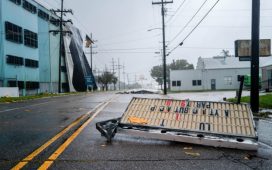Unlock the Editor’s Digest for free
Roula Khalaf, Editor of the FT, selects her favourite stories in this weekly newsletter.
The chief executive of one of the world’s biggest reinsurers has dismissed calls for the industry to cut the price of natural catastrophe cover as “noise” and “nonsense”, arguing it has simply responded to rising costs.
Soaring reinsurance prices in recent years have been one factor in an affordability crisis for a swath of consumers looking to insure their homes and businesses against natural disasters such as severe storms and wildfires.
In an interview with the Financial Times, Munich Re chief executive Joachim Wenning rejected calls for reinsurers — who offer cover to primary insurers — to help take the pressure off businesses and consumers, now that rising prices have brought in record profits for the industry.
Munich Re itself posted record first-half profits partly because of the rising cost of property cover. It now has a €65bn market capitalisation.

“I never hear the opposite of these statements, when the market cycle is a little bit softer, that they say: give the reinsurers a little more, they deserve it, because they don’t make enough money,” Wenning said. “This is very asymmetric, this is noise, this is nonsense.”
The sector was still making up for a run of catastrophe-hit years when returns fell because of high claims costs, he added, saying that if reinsurance was too expensive, primary insurers could simply choose to buy less cover.
Wenning went on to say that it would be “an increasing challenge” for consumers to find affordable property insurance in disaster-prone areas.
“Due to climate change” insurance losses were likely to rise and cover would have to be more expensive, he said. “It will be harder for corporates and for private households to pay for it. It’s not a systematic impossibility, it just becomes more expensive.”
Some policymakers have argued for more public-private schemes to share the cost of disasters, adding to existing programmes in some countries that cover flooding and other extreme weather.
Wenning said any further schemes needed to be carefully designed to minimise price distortion.
“If you have property in a highly risk-exposed area, you should pay more. If that doesn’t happen . . . then we socialise the risk.”
Reducing the financial incentive for homes and businesses to protect themselves against natural disasters could drive up losses from future events, he added.
Reinsurers generally maintain very high solvency ratios — capital as a percentage of the minimum required by the regulator — to protect themselves against major losses.
Munich Re’s solvency ratio rose to 287 per cent in the first half of the year, well above its 175to 220 per cent target range, suggesting it has excess capital to deploy.
One option, Wenning said, was more M&A, in areas such as US speciality insurance and expanding its primary insurance division Ergo in markets where it already has operations.
Deals in the €1bn to €5bn range were realistic, he said. “Systematically, proactively we might look into which [companies] would fit into our roster.”
He also warned about the threat posed by a major cyber attack. Here, a public-private scheme to share losses could play a role, he said.
Giving the example of an attack that paralysed a country’s energy supply, the market does not currently have the capacity to offer big companies enough cover against losses from such an event, he said.
“In the end they have to retain the risk and they have to do everything to mitigate their own risks.”









